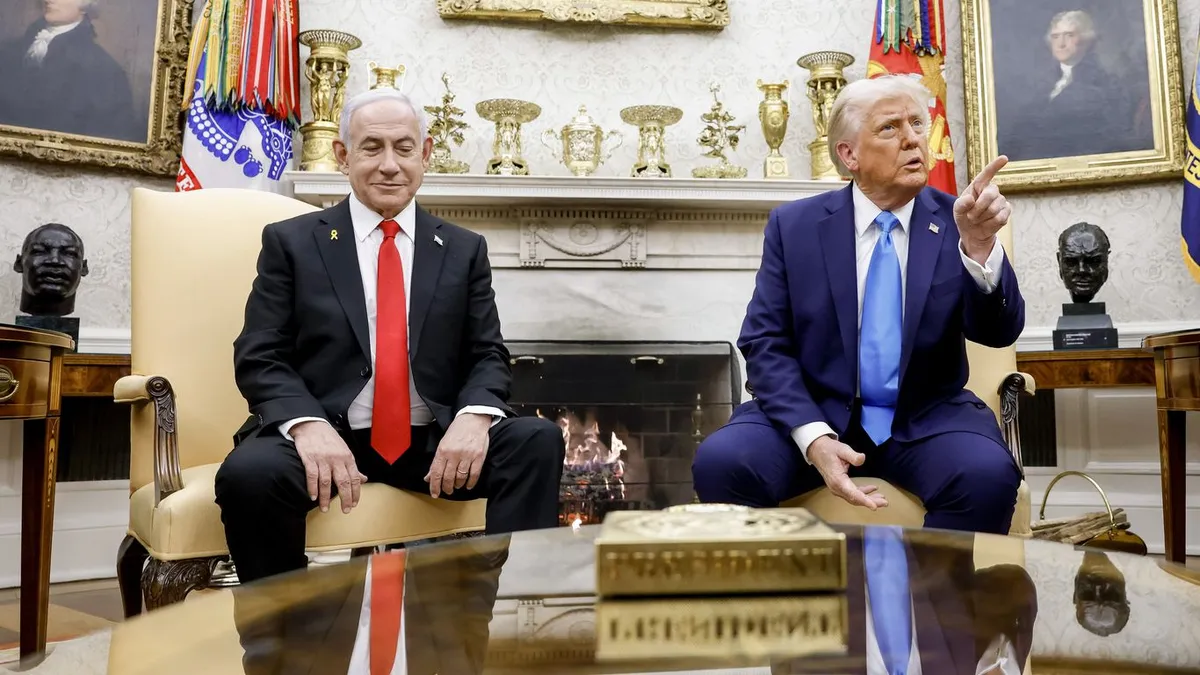
President Trump's upcoming meeting with Israeli Prime Minister Benjamin Netanyahu on Monday is set to present a crucial choice: either embrace Trump's proposed plan to end the ongoing conflict in Gaza or risk a significant rupture with the United States, leading to further international isolation.
This meeting holds unprecedented significance, as it marks the first time since returning to the White House that Trump seems poised to challenge Netanyahu regarding Gaza and press for a peace agreement. In a recent interview with Axios, Trump indicated that his plan for Gaza is nearing completion and claimed that Netanyahu is in agreement with his approach. However, the Israeli Prime Minister's public remarks have been notably vague, raising questions about his true stance.
During the Monday meeting at the White House, which will include a lunch and a press conference, Trump hopes to unveil a new deal. A Trump adviser involved in the peace negotiations stated, "The Arabs have agreed to it like 100%. Now we're waiting for the president to work his magic on Netanyahu." The adviser emphasized that if Netanyahu declines the deal, he would bear the responsibility for the continued conflict, the ongoing humanitarian crisis, and the plight of Palestinians suffering from food shortages.
Historically, Trump has refrained from publicly criticizing Netanyahu for the prolonged conflict with Hamas or for the failure to secure the release of remaining hostages. However, if Netanyahu rejects the proposed deal this time, some aides believe Trump may pivot against the Prime Minister. Support for Israel, particularly in the context of the war in Gaza, has dwindled significantly, even within the White House and among Trump's core supporters. An administration official noted, "Everyone — and I mean everyone — is exasperated with Bibi," referring to Netanyahu's nickname.
White House envoy Steve Witkoff and Trump’s son-in-law Jared Kushner met with Netanyahu in New York just before the meeting to address the final differences surrounding Trump's 21-point peace plan. Both advisers reportedly feel frustrated with Netanyahu's approach. Witkoff has been focused on Israel, while Kushner has been engaged with Arab nations, yet both are nearing the end of their patience with the Israeli leader.
The latest peace initiative ironically emerged from Israel's unsuccessful attempt to eliminate Hamas leaders through a controversial missile strike in Qatar. This aggressive action inadvertently united Gulf Arab states, as noted by a Trump adviser who stated, "They are all one. They speak with one voice." This newfound unity among Arab nations prompted Witkoff and Secretary of State Marco Rubio to recognize it as a pivotal moment for peace talks.
Frustration with Netanyahu has been building for months among Trump's circle, both inside and outside the White House. Some advisers have claimed that Netanyahu has been manipulating the situation to his advantage, particularly as he faces political challenges at home. A senior White House official commented that Netanyahu's aggressive tactics, including military actions, are likely aimed at bolstering his political survival amidst ongoing legal troubles.
U.S. and Israeli officials now believe that Netanyahu must choose between adhering to Trump's desire for peace and catering to his ultranationalist coalition partners, who advocate for a continued military offensive. Compounding this dilemma is Netanyahu's foray into U.S. domestic politics. Recently, at the UN, he engaged with conservative U.S. social media influencers, seeking their support to bolster Israel's image online. He remarked, "We have to fight with weapons that apply to the battlefield, and the most important ones are on social media," while also criticizing what he labeled the "woke right."
In various interviews, Trump advisers have expressed confusion over Netanyahu's preoccupation with U.S. political discourse. One White House official remarked, "We can't figure out what the guy is up to. Focus on Israel. Focus on Gaza. Stop getting involved in U.S. domestic political issues." They urged Netanyahu to refrain from engaging in social media propaganda and instead concentrate on achieving a viable peace agreement.